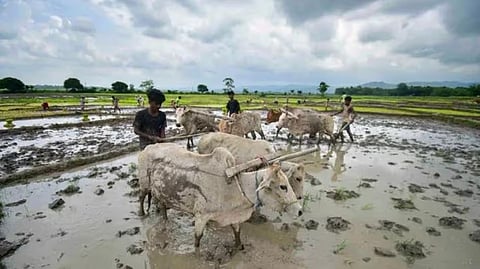
- Home
- Live Blog
- Breaking News
- Top Headlines
- Cities
- NE News
- Sentinel Media
- Sports
- Education
- Jobs

Mowsam Hazarika
(The writer can be reached at mowsam2000@yahoo.co.in.)
Launched in 2019, the Pradhan Mantri Kisan Samman Nidhi (PM-KISAN) scheme aimed to provide direct financial support to farmers across India. By offering an annual income support of Rs. 6,000, the scheme sought to alleviate some of the financial burdens faced by India’s agricultural community. However, its impact in Assam—a state where farming plays a vital socio-economic role—has generated mixed responses, raising questions about the scheme’s efficacy in tackling the unique challenges faced by Assam’s agricultural sector.
One of the primary issues with PM-KISAN is its limited scope in addressing Assam’s deep-seated agricultural challenges. The scheme’s Rs. 6,000 annual aid, provided in three installments of Rs. 2,000, is often too modest to meaningfully address the high input costs, including seeds, fertilisers, and labour. Farmers in Assam also face additional struggles with unpredictable climate conditions, including frequent floods, which lead to crop damage and soil erosion. The lack of sufficient infrastructure, such as irrigation systems, storage facilities, and efficient transport networks, exacerbates these issues, and the relatively small financial aid provided by PM-KISAN cannot compensate for these substantial structural deficiencies. As a result, many farmers find themselves unable to break free from cycles of debt and poverty.
The scheme’s implementation in Assam has been plagued by bureaucratic hurdles and administrative inefficiencies. Reports indicate that enrollment processes can be convoluted, particularly for rural farmers who may not have easy access to registration centres or the necessary digital literacy. Instances of ‘ghost beneficiaries’—non-farmers receiving funds due to systemic loopholes—have diverted aid away from genuine farmers who urgently need assistance. In Assam, where large swaths of the farming population remain marginalised, these inefficiencies have stirred dissatisfaction and scepticism regarding the scheme’s ability to deliver genuine relief to those in need.
PM-KISAN, despite its intent, has indirectly affected agricultural work culture in Assam. Direct cash transfers have led some farmers to rely more on government support than on sustaining their agricultural practices. This dependency may, over time, discourage engagement in traditional farming activities, potentially hindering productivity and weakening long-established agricultural practices. In a region where agriculture has long been the economic backbone, sustaining agricultural engagement is crucial for the sector’s long-term health.
The disparity in benefit distribution under PM-KISAN also highlights inequalities within Assam’s agricultural sector. While the scheme is intended to reach all farmers, it has disproportionately benefitted landowners with formal titles, sidelining small-scale and marginal farmers who own less land or face issues with formal documentation. This imbalance is especially detrimental in Assam, where most farmers fall within the small and marginal categories. Without adequate support, these farmers remain vulnerable and struggle to maintain livelihoods, perpetuating income inequality within the farming community.
The scheme’s exclusion of tenant farmers, who cultivate land they do not own, further diminishes its inclusivity. Assam has a substantial number of tenant farmers, yet PM-KISAN’s benefit structure does not accommodate them, as it is tied to land ownership documentation. This oversight excludes a significant segment of Assam’s agricultural workforce from receiving financial aid, neglecting the needs of those who work the hardest to sustain agricultural output. Consequently, PM-KISAN fails to recognise and support the full spectrum of contributors to Assam’s agrarian economy.
One of the scheme’s most critical limitations is its focus on financial aid over infrastructural investments. While the Rs. 6,000 support per year offers short-term relief, it does little to foster long-term resilience in Assam’s agricultural sector. Issues such as inadequate irrigation, dependence on monsoon rains, soil health deterioration, and lack of access to technology require infrastructural interventions and dedicated support programs. Without substantial investment in these areas, Assam’s agricultural sector remains vulnerable to both environmental challenges and market fluctuations. A shift in focus toward infrastructural development could lay the foundation for sustainable growth, empowering farmers to withstand adverse conditions and enhance productivity.
Moreover, PM-KISAN’s financial support has inadvertently led to unmet expectations among farmers. Administrative delays or incomplete enrollment processes have resulted in farmers not receiving benefits as anticipated, which can lead to frustration and increased mental stress. Coupled with the financial instability that already burdens farmers, this emotional toll can impact farmers’ motivation and ability to sustain their livelihoods effectively.
The existence of PM-KISAN may also lead policymakers to overlook the necessity of deeper, more structural reforms within agriculture. While PM-KISAN provides immediate, albeit modest, financial relief, it does not address systemic issues such as fair crop pricing, market reforms, or the development of more inclusive support frameworks. By prioritising financial handouts over foundational reforms, there is a risk of deferring essential changes that could significantly strengthen Assam’s agricultural sector in the long term. Without a comprehensive approach that includes market reforms and infrastructure, Assam’s farmers may continue to face obstacles that prevent the agricultural sector from achieving sustainable progress.
In conclusion, while PM-KISAN was introduced with the intention of supporting farmers, it falls short of effectively addressing the unique challenges of Assam’s agricultural sector. It’s limited financial scope, bureaucratic inefficiencies, failure to include tenant farmers, and lack of focus on infrastructure highlight the need for reforms and enhancements. For Assam’s agriculture to truly benefit, policymakers should adopt a holistic approach that combines direct support with targeted infrastructural investments, improved access to markets, and comprehensive support for marginalised farmers. By addressing these gaps, Assam can move towards building a resilient agricultural economy that genuinely serves the needs of all its farmers.